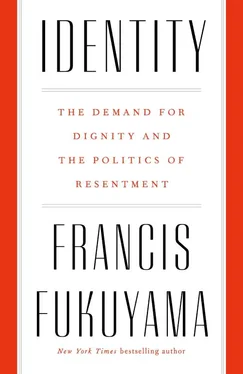The social democratic left also reached a dead end of sorts: its goals of an ever-expanding welfare state bumped into the reality of fiscal constraints during the turbulent 1970s. Governments responded by printing money, leading to inflation and financial crisis; redistributive programs were creating perverse incentives that discouraged work, savings, and entrepreneurship, which in turn limited the size of the pie available for redistribution. Inequality remained deeply entrenched, despite ambitious efforts such as Lyndon Johnson’s Great Society to eradicate it. With the collapse of the Soviet Union in 1991 and China’s shift toward a market economy after 1978, the Marxist left largely collapsed, and social democrats were left to make their peace with capitalism. The left also came to share with the right an increasing disillusionment with government itself after failures such as the Vietnam War and the Watergate scandal.
The diminished ambitions for large-scale socioeconomic reform converged with the left’s embrace of identity politics and multiculturalism in the final decades of the twentieth century. The left continued to be defined by its passion for equality, but that agenda shifted from its earlier emphasis on the conditions of the working class to the often psychological demands of an ever-widening circle of marginalized groups. Many activists came to see the old working class and their trade unions as a privileged stratum with little sympathy for the plight of groups such as immigrants or racial minorities worse off than they were. Recognition struggles targeted newer groups and their rights as groups, rather than the economic inequality of individuals. In the process, the old working class was left behind.
Something similar happened in European countries such as France, where the hard left had always been more prominent than in the United States. After the événements of May 1968, the revolutionary goals of the old Marxist left no longer seemed relevant to the new Europe that was emerging. The left’s agenda shifted to culture: what needed to be smashed was not the current political order that exploited the working class, but the hegemony of Western culture and values that suppressed minorities at home and developing countries abroad. {8} 8 Mathieu Bock-Côté, Le multiculturalisme comme religion politique (Paris: Les Éditions du Cerf, 2016), 16–19.
Classical Marxism had accepted many of the underpinnings of the Western Enlightenment: a belief in science and rationality, in historical progress, and in the superiority of modern societies over traditional ones. By contrast, the new cultural left was more Nietzschean and relativistic, attacking the Christian and democratic values on which the Western Enlightenment had been based. Western culture was seen as the incubator of colonialism, patriarchy, and environmental destruction. This critique then filtered back into the United States as postmodernism and deconstructionism in American universities.
Europeans became more multicultural, both in fact and as a matter of principle. Immigrant communities, often heavily Muslim, grew in many European countries in response to early post–World War II labor shortages. In the early days, activists in these communities pushed for equal rights for immigrants and their children, but found themselves frustrated by continuing barriers to upward mobility and social integration. Inspired both by the 1979 Iranian Revolution and by Saudi support for Salafist mosques and madrassas, Islamist groups began to appear in Europe that argued that Muslims should not seek to integrate, but should maintain separate cultural institutions. Many people on the European left embraced this trend, regarding Islamists as more authentic spokesmen for the marginalized than westernized Muslims who had chosen to integrate into the social system. {9} 9 Sasha Polakow-Suransky, Go Back to Where You Came From: The Backlash Against Immigration and the Fate of Western Democracy (New York: Nation Books, 2017), 23–24.
In France, Muslims became the new proletariat, with part of the left abandoning its traditional secularism in the name of cultural pluralism. Criticisms that Islamists were themselves intolerant and illiberal were often downplayed under the banner of antiracism and countering Islamophobia.
The shifting agenda by the progressive left in the United States and Europe had both advantages and drawbacks. The embrace of identity politics was both understandable and necessary. The lived experiences of identity groups are different from one another and often need to be addressed in ways specific to those groups. Outsiders to those groups often fail to perceive the harm they are doing by their actions, as many men realized in the wake of the #MeToo movement’s highlighting of sexual harassment and sexual assault. Identity politics aims at changing culture and behavior in ways that will have real benefits for the people involved.
By turning a spotlight on narrower experiences of injustice, identity politics has brought about welcome changes in concrete public policies that have benefited the groups in question, as well as in cultural norms. The Black Lives Matter movement has made police departments across the United States much more conscious of the way they treat minority citizens, even if cases of police abuse still continue. The #MeToo movement has broadened popular understanding of sexual assault, and has opened an important discussion of the inadequacies of existing criminal law in dealing with it. Its most important consequence is probably the broad normative shift that it has already brought about in the way that women and men interact in workplaces around the United States and beyond.
So there is nothing wrong with identity politics as such; it is a natural and inevitable response to injustice. It becomes problematic only when identity is interpreted or asserted in certain specific ways. Identity politics for some progressives has become a cheap substitute for serious thinking about how to reverse the thirty-year trend in most liberal democracies toward greater socioeconomic inequality. It is easier to argue over cultural issues within the confines of elite institutions than it is to appropriate money or convince skeptical legislators to change policies. The most visible manifestations of identity politics have appeared on university campuses from the 1980s onward. University curricula can be more readily altered to include readings of women and minority authors than can the incomes or social situations of the groups in question. Many of the constituencies that have been the focus of recent identity claims, such as female executives in Silicon Valley or aspiring women actresses and filmmakers in Hollywood, are near the top of the income distribution. Helping them to achieve greater equality is a good thing, but will do nothing to address the glaring disparities between the top 1 percent and the remaining 99.
This points to a second problem that arises with a focus on newer and more narrowly defined marginalized groups: it diverts attention from older and larger groups whose serious problems have been ignored. A significant part of the white American working class has been dragged into an underclass, comparable to the experience of African-Americans during the 1970s and ’80s. Yet one has heard little concern from activists on the left, at least until recently, about the burgeoning opioid crisis, or the fate of children growing up in impoverished single-parent families in the rural United States. Progressives today have no ambitious strategies for dealing with the potentially immense job losses that will accompany advancing automation, or the income disparities that technology may bring to all Americans, white or black, male or female. The same problem afflicts parties of the left in Europe: the French Communist and Socialist parties have lost significant numbers of voters to the National Front in recent decades, while the German Social Democrats’ embrace of Angela Merkel’s welcome of Syrian refugees led to similar defections in the 2017 elections. {10} 10 Theo Lochocki, “Germany’s Left Is Committing Suicide by Identity Politics,” Foreign Policy , January 23, 2018.
Читать дальше












